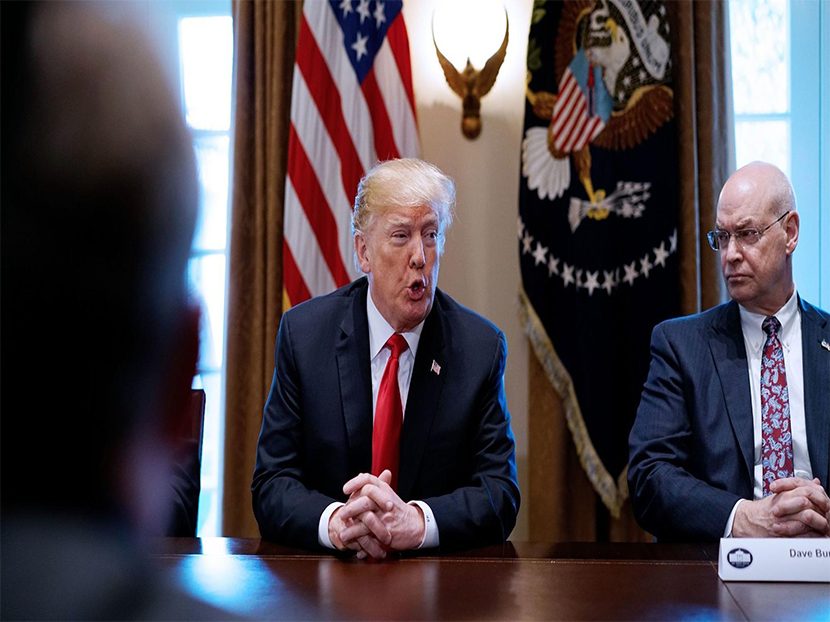Trade Groups Respond to Trump Tariffs

A number of industry associations have issued statements over the recent tariffs placed by the Trump Administration on imported steel and aluminum:
ACCA
“ACCA is concerned that increased costs of HVACR equipment caused by tariffs on steel and aluminum will negatively impact professional contractors and consumers,” said Paul T. Stalknecht, ACCA president and CEO. “When the price of HVACR equipment increases, consumers who are in need of a new system trend toward cut-rate and unqualified individuals to service or replace their equipment. It also shifts the mindset of consumers to opt for putting Band-Aids on aging systems instead of replacing them with today’s more efficient products.”
AGC
Construction costs escalated in February, driven by price increases for a wide range of building materials including steel and aluminum, according to an analysis by the Associated General Contractors of America of Labor Department data.
Association officials warned that newly imposed tariffs on those metals will create steeper increases that will squeeze budgets for infrastructure, school districts and commercial projects.
"Price increases have accelerated for many construction materials in the last two years, with additional increases already announced, and others on the way as soon as tariffs on steel and aluminum take effect," said the association's chief economist, Ken Simonson. "Contractors will be forced to pass these cost increases along in bid prices, but that will mean fewer projects get built. And contractors that are already working on projects for which they have not bought some materials are at risk of absorbing large losses."
AHRI
“As we made clear in letters to the president, and to Commerce Secretary Wilbur Ross and U.S. Trade Representative Robert Lighthizer, AHRI does not support additional tariffs on steel and aluminum due to their impact on manufacturers and consumers,” the Air-Conditioning, Heating, and Refrigeration Institute’s statement said.
"As major users of steel and aluminum, we have been proactive in explaining to the administration that the HVACR and water heating industry would be negatively impacted by an increase in tariffs, as would the consumers that rely on the products we manufacture," AHRI President and CEO Stephen Yurek added. "While we have been pleased with the Trump Administration's enthusiastic support for manufacturing, we believe this step to be injurious, rather than helpful, to our efforts to increase American manufacturing and create jobs."
ASA
“As an industry reliant on both domestic and imported steel, the American Supply Association opposes this decision and is sounding the alarm bells over the impacts this could have. By propping up the domestic steel and aluminum industry, we risk doing more harm than good. This decision will result in placing limits on the essential resources needed to deliver finished goods to our customers. In addition to the likelihood that projects may be delayed, our members foresee a shortage of domestic capacity that may struggle to ramp up production in response to these changes. Not only do we believe domestic mills are likely to increase their prices in the near-term, commiserate with those of imported product, but our members remain equally alarmed over the prospect of limited supplies, many of which are already dwindling. As an association that represents not only distributors of steel and aluminum products, ASA also represents manufacturers that rely on these essential raw materials to produce items used in our homes and communities every day. We believe this will result in a new tax placed on the consumer, while crippling many in manufacturing and should be reconsidered. ASA looks forward to taking our case to lawmakers on Capitol Hill as well as the White House on the 18th and 19th of April.”
HARDI
According to a survey of Heating, Air-conditioning and Refrigeration Distributors International members conducted by the HARDI Sheet Metal & Air Handling Committee that concluded on March 7, the current overall domestic production capacity of steel and aluminum HVACR products cannot alone meet current demand of the domestic market.
“The American steel and aluminum industries also cannot currently make certain materials such as the low-gauge foil required to make FSK (Foil-Scrim-Kraft) facings used on essential duct insulating products such as duct board and duct wrap. Therefore, our concern is that an increase in aggregate costs brought by the new tariffs may also result in a decrease in demand for HVACR products further along the supply chain.
“HARDI does not currently know how these tariffs will affect the demand of finished HVACR products in terms of quantified metrics, but going forward HARDI intends to quantify this impact through closely monitoring its benchmarking and statistical programs.”




